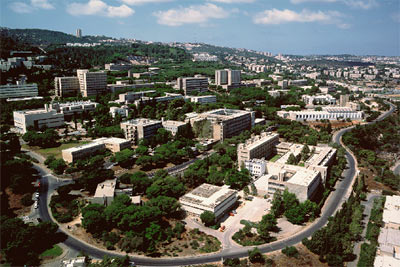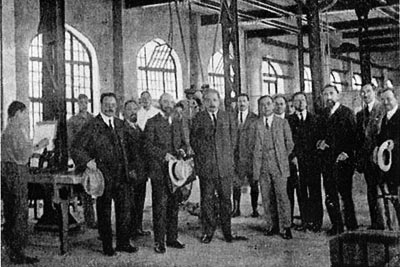Cornell, Technion share innovation and 'land grant' vision
By Bill Steele


It should not be a surprise that Cornell and The Technion -- Israel Institute of Technology have formed a partnership to propose building a new campus in New York City focused on technology, innovation and commercialization. A web of collaborative research and a shared mission have been connecting them for at least two decades.
"They are two institutions that are land-grant to the world," said Carol Epstein '61, a member of the Cornell University Council who also sits on the International Board of Governors of the Technion and the National Board of Directors of the American Technion Society. Epstein cited President David Skorton's 2007 State of the University address: "We are … dedicated to applying the fruits of our research and teaching to help solve the world's problems."
As New York's land-grant university, Cornell was created to advance the state's agriculture and technology as well as to teach and make contributions in all fields of knowledge, and it has evolved into world leader in research and high-tech innovation. Technion, founded in 1912 by a group that included Albert Einstein, was created to train engineers to support the anticipated state of Israel. Its graduates helped to build the county's infrastructure and started the high-tech industries that today make Israel a modern country with the greatest concentration of high-tech startup companies anywhere outside of Silicon Valley. More than 70 percent of the country's founders and managers of high-tech industries are Technion graduates.
And like Cornell, Technion looks beyond borders. In its mission statement, it is "dedicated to the creation of knowledge and the development of human capital and leadership, for the advancement of the State of Israel and all humanity."
With the creation of the Bruce Rappaport Faculty of Medicine in 1969, the Technion joined Cornell as one of a select group of institutions incorporating both engineering education and a medical school. Its campus is also on a hill, overlooking Haifa, where the view of the Mediterranean rivals Cornell's vista of Cayuga Lake. In the city below such high-tech giants as Microsoft and Google have set up shop, hoping to take advantage of Technion research and recruit its students.
Shared research
Cornell and Technion faculty have been cross-pollinating for years, especially in engineering. Joseph Halpern, professor and chair of computer science, has been collaborating for more than 20 years with Yoram Moses, his first Ph.D. student and now a professor of computer science at Technion. In 1984, the two wrote a seminal paper about how two people -- or two computer network nodes -- could communicate and know for sure that their messages had been received. The paper earned them the Gödel Prize and the Dijkstra Prize, two of the most prestigious honors in computer science, and it has been cited more than 1,000 times. They have written a book on the topic and continue to issue joint papers.
Halpern can think of at least eight or nine other faculty members in his department alone who work with Technion researchers. It's not because anyone told them to do this, he added. "People collaborate with others who share their interests," he said. "[Technion] is strong in areas we're interested in." Personal visits back and forth are common, he noted, with travel often paid for by the US-Israel Binational Science Foundation (BSF), created in 1972 by the two governments to encourage collaboration between their researchers.
When you find those common interests, the collaborator may not even be in your own discipline. Frank Wise, professor of applied and engineering physics, has been working for years with Efrat Lifshitz, professor of chemistry at Technion, on nanocrystal materials that promise more efficient solar cells. "Her synthesis capability is more general and more informed than ours," Wise explains. "She makes it, we calculate and measure." They visit each other in alternate years, again with BSF funding.
Robert Kleinberg, assistant professor of computer science, has worked with Ron Lavi, senior lecturer in the Faculty of Industrial Engineering and Management at Technion, since 2003, when the two were in graduate school in California. They were at different schools, but became "conference buddies" because they shared an interest in the application of computer science to economics. Lavi visits Ithaca about once a year and Kleinberg travels to Haifa. In between they burn up bandwidth on Skype. The parallels between Cornell and Technion, Kleinberg said, "are personified in two people."
An "ancillary benefit" of the collaboration, Kleinberg noted, was persuading Lavi's star master's student, Sigal Oren, to come to Cornell for her Ph.D. "She's written some very provocative and newsworthy papers," he said. "A good catch."
Exchanging students and teachers
Other Technion grads have enrolled at Cornell, not surprising because they have already been selected for high academic standards. Andy Ruina, professor of mechanical and aerospace engineering, recalls a student who came with a recommendation almost biblical in tone: "To Yuvall Katzman metal is like clay, something to be formed into any shape you like." After building some spectacular apparatus for Ruina, Katzman went on to a highly successful career as an inventor in Israel.
Technion has, understandably, special expertise in the management of water resources. Professors in Cornell's School of Civil and Environmental Engineering (CEE) report ongoing collaborations with their counterparts at CEE-Technion. Hillel Rubin, professor emeritus of environmental, water and agriculture engineering at Technion and a specialist in the remediation of contaminated groundwater, was Mary Upson Visiting Professor at Cornell in 2003-04, working with Christine Shoemaker, the Joseph P. Ripley Professor of Engineering, to publish three papers on groundwater contamination.
Cornell faculty are just as likely to teach in Israel. Zygmunt Haas, professor of electrical and computer engineering, has just settled in for two semesters in the electrical engineering department at the Technion, at the invitation of the department chair, teaching a course in his specialty, wireless networks. An administrator at Technion can quickly reel off the names of 15 Technion faculty members, past and present, who have studied or taught at Cornell.
Cornell President David Skorton also has had Technion connections. He and Technion President Peretz Lavie developed a good relationship when Skorton led an American Jewish Committee Project Interchange tour of Israel with other university presidents in the summer of 2010. "Peretz and I hit if off, and then we reconnected over the NYC Tech Campus proposal," Skorton said. In addition, he said, "Some years ago, when I was at the University of Iowa, I had the chance to visit the Technion and to establish a relationship with a late member of the Technion faculty, Sam Sideman [who led the Technion's biomedical engineering department], and with Dr. Rafi Beyar, currently CEO and director general of the Rambam Health Care Campus in Haifa."
MacArthur "genius award" winner Michal Lipson, associate professor of electrical and computer engineering and one of four current Cornell faculty members who are Technion graduates, finds yet another similarity between the two institutions: Both are somewhat isolated geographically. This helps explain their creativity, she suggested. "You don't feel like you need to do what everybody else is doing."
For Lipson, partnership in the New York City venture makes perfect sense. "I'm delighted to hear this news, as Technion is a second home to me," she said. "Technion and Cornell are two world-class institutions, which house the world's best scientists. This partnership stands for a very strong collaboration."
Media Contact
Get Cornell news delivered right to your inbox.
Subscribe